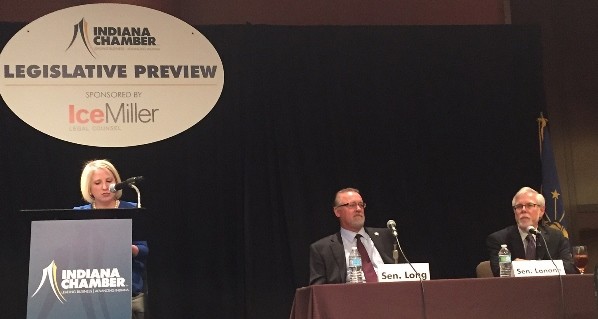 For the last decade, the Chamber has strongly advocated to have a state-funded high quality pre-K program for children from low-income families. While we were successful in achieving a small pilot program for five counties a few years ago, we were able to significantly increase the state’s investment this legislative session. The Chamber helped to lead a strong coalition of community leaders, businesses, philanthropies and providers to achieve $44 million appropriated in the two-year budget (HB 1001) to expand the pilot. We can now increase the number of counties from the original five to up to 20, with a preference given to rural areas.
For the last decade, the Chamber has strongly advocated to have a state-funded high quality pre-K program for children from low-income families. While we were successful in achieving a small pilot program for five counties a few years ago, we were able to significantly increase the state’s investment this legislative session. The Chamber helped to lead a strong coalition of community leaders, businesses, philanthropies and providers to achieve $44 million appropriated in the two-year budget (HB 1001) to expand the pilot. We can now increase the number of counties from the original five to up to 20, with a preference given to rural areas.
Separately, we successfully advocated for a lowering of the county match of dollars from a base of 10% down to 5%. In addition, we worked on offering up to 20% of the appropriated dollars to be used for capacity-building grants to allow for providers to grow more high-quality placements. This was a priority for both the House and Senate leadership, as well as Gov. Holcomb and the final bills passed with strong bipartisan votes of 82-16 and 31-19, respectively.
The Chamber also were able to pass a bill (SB 248) that would allow small school corporations situated in the same or adjoining counties to consolidate services if 20% of legal voters in both school districts petition the trustees of their respective school corporations. A small school consolidation grant that was originally included in this bill was moved into the budget to help offset costs. The Indiana Chamber has been supportive of this legislation in previous sessions and most recently, the Indiana Chamber Foundation has commissioned and is finalizing a study that shows the direct correlation between smaller school corporations and lower postsecondary attainment for students.
The Chamber has had a long-standing policy to support the opportunity to reduce administrative costs by merging or consolidating administrative services in smaller school districts, which we believe will in turn reduce the duplication of programs or services, increase cost efficiencies relating to the use of school facilities, plus reduce debt and provide for establishing other cost-cutting measures.
And we can now check off a legislative agenda item that the Chamber has been advocating for over 30 years to complete. House Bill 1005 will move the Superintendent of Public Instruction from an elected to appointed position. We had originally advocated for this bill with an effective date of 2021 (and therefore no election in 2020); however, the Senate version of the bill died by surprise on the Senate floor on third reading. That meant to consider the House version (which was virtually identical), the content had to be “substantially different” than the failed bill, per Senate rules.
Therefore, the Senate amended the bill to change the effective date to 2025 and include a residency requirement of two years and have certain educational experience. The Chamber did not support these changes as we felt that Indiana’s education leader should be the best person available and no other appointed state agency position has such required qualifications. However, it was decided by Senate leadership and counsel that the changes had to remain for the measure to proceed. So while we are extremely happy that we were able to get the position appointed, we are disappointed with the additional requirements. The Chamber will continue to advocate for these to be stripped from statute in subsequent sessions, although we feel that it will likely be a very difficult lift.




 It is now late summer, and that means that we’ve reached back-to-school time in Indiana. It is a big year in the Auslander household as my youngest embarks on her first year of pre-K. However, there are thousands of less-fortunate Hoosier 4-year olds that will not have that opportunity to join her.
It is now late summer, and that means that we’ve reached back-to-school time in Indiana. It is a big year in the Auslander household as my youngest embarks on her first year of pre-K. However, there are thousands of less-fortunate Hoosier 4-year olds that will not have that opportunity to join her.